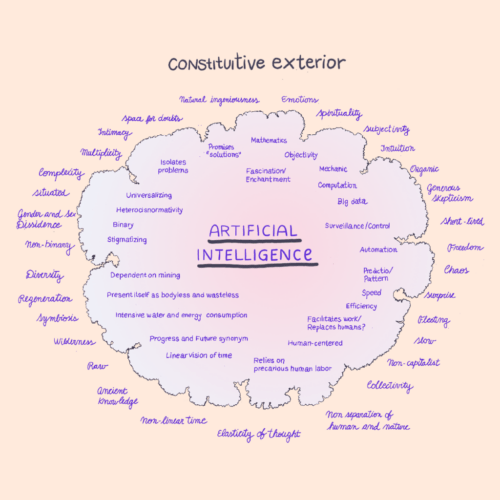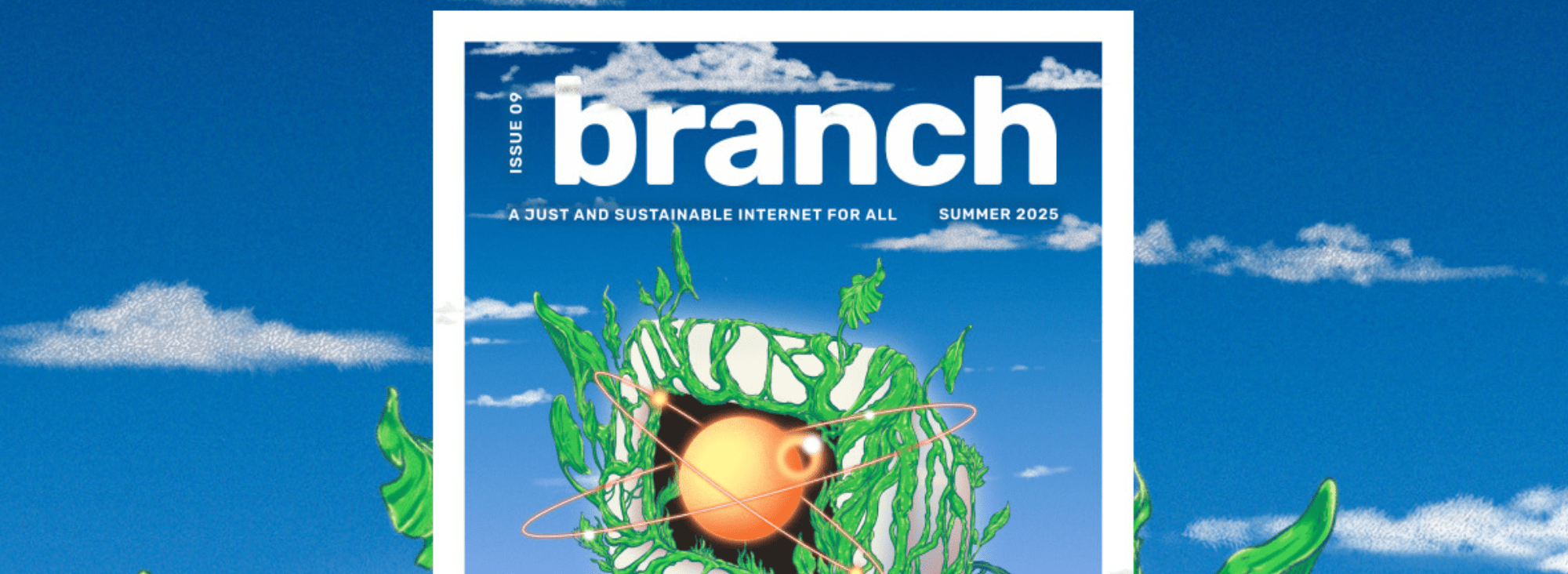New article “Compost Engineers and Sus Saberes Lentos: A Manifest for Regenerative Technologies” published in Branch Magazine.
#artificial intelligence #feminisms #speculative futuresBranch Magazine, an online publication written by and for people who dream of a sustainable and just internet for all, recently launched Issue 9 with the theme “Attunement – Designing in an Era of Constraints”, featuring the article “Compost Engineers and Sus Saberes Lentos: A Manifest for Regenerative Technologies” by Joana Varon and Lucía Egaña Rojas. This piece presents a condensed version of the homonymous manifesto we published in 2024, available in full on our website.
The authors invite us to a radical exercise: completely reimagining our relationship with technology, transforming it into a tool of regeneration inspired by nature, feminism, and ancestral knowledge.
Instead of Silicon Valley’s metallic future, loaded with colonialist, patriarchal, and extractivist values that populate the “Artificial Intelligence” imaginary, they propose technologies that regenerate life
The Constitutive Exterior of AI: what gets left out?
To answer this question, Varon and Egaña Rojas developed a diagram that demonstrates what lies within the AI concept sold by media and large corporations—mathematics, objectivity, efficiency, speed, surveillance, and automation—and what remains outside: emotions, spirituality, subjectivity, ancestral knowledge, intuition, diversity, cooperation, and regeneration.
“Can we reverse the logics and imaginaries that have permeated conceptions of technology for centuries up to today?”

Influenced by debates from Latin American feminists Gloria Anzaldúa, Ochy Curiel, and Silvia Rivera Cusicanqui—who explore the nuances and intersections of things and beings that are neither pure nor clean—and inspired by Donna Haraway’s text “The Camille stories: children of compost,” which presents “compost communities” that produce “healing and ongoingness through making kin in innovative ways,” the authors propose composting all the garbage that Western patriarchal imaginaries are producing in AI development.
The work of these engineers is to reposition other types of intelligence at the center of technological development, challenging the Western vision that systematically excludes emotional, spiritual, and intuitive intelligences. They create space to nourish technology with feminist values and visions that can regenerate what we once had, operating at a pace outside capitalist logic, connected to the environment and other ways of living.
The compost originated from waste to create life. The work of the compost engineers is to take to the garbage all these western-centered patriarchal imaginaries and practices that are leading AI development and let it compost. We will nourish it by feminist values and views as a constitutive outside to grow a space for technologies that – instead of generating more and more content, trash, extraction, and oppression – focus on regenerating what we once had.
Read the complete article in Branch Magazine and come reconnect with technologies of life, technologies del buen vivir.
Want to dive deeper? The full study is available here.
About the Authors
Joana Varon is Brazilian with Colombian ancestry, founder-director and creative chaos catalyst at Coding Rights, a feminist organization that contributes to debates about technology development, implementation, and regulation from a collective, transfeminist, decolonial, and anti-racist human rights perspective. Through creativity and hacker knowledge, it seeks to stimulate imaginaries and actions that challenge power inequalities. Former fellow at Harvard’s Berkman Klein Center for Internet and Society, former Technology and Human Rights Fellow at the Carr Center for Human Rights Policy at Harvard Kennedy School, and former Mozilla Media Fellow. As a feminist and human rights defender, she has over 15 years of experience influencing debates in international technology governance arenas, from diplomatic to technical forums, including the Internet Engineering Task Force (IETF), where she was part of the research group that initiated the working group on Human Rights Protocol Considerations. She is also co-creator of various projects operating at the intersection of activism, arts, and technologies, including transfeministech.org, cartografiasdainternet.org, museamami.org, Chupadados.com, #safersisters, Safer Nudes, protests.org, Net of Rights, and freenetfilm.org.
Lucía Egaña Rojas studied Art, Aesthetics, and Creative Documentary and holds a PhD in Audiovisual Communication. As an artist, she works on projects that problematize the construction of social imaginaries and sources of hegemonic knowledge. Her projects are formalized through artistic production, writing, research, pedagogy, and self-institutional practices. Her artistic work cannot be circumscribed to a specific medium and can be consulted at http://luciaegana.net. In education, she moves between academic spaces and informal pedagogies. She was a teacher and part of the academic direction of the Independent Studies Program (PEI) at the Museum of Contemporary Art of Barcelona (MACBA), associate professor at the Faculty of Fine Arts of the University of Barcelona, guest lecturer in the Gender Studies Master’s at the University of Chile, and in the MUECA Master’s (UMH). Within transfeminist activism, she organized the post-pornography festival Muestra Marrana and in 2011 made the documentary “Mi sexualidad es una creación artística,” currently co-directing the Instituto de Estudios del Porno. Her writing explores different formats, from fiction to essay, through poetic prose, manifesto, and academic text. She has published “Enciclopedia del amor en los tiempos del porno” (Cuarto propio, 2014; Trío editorial, 2020), “Atrincheradas en la carne. Lecturas en torno a las prácticas postpornográficas” (Bellaterra, 2018), “Acá soy la que se fue” (tictac ediciones, 2019), “Una cartografía extraña” (Metales Pesados, 2021), among others. Her artistic work is often expressed collectively, participating in Musea M.A.M.I, Centro de Estudios de la Naturaleza Extractiva (CENEx), and Pluriversidad Nómada, a project promoted together with Quimera Rosa. Her main interests involve feminisms, methodologies, technology, north-south power relations, colonial and migratory processes, extractivism, and error.
